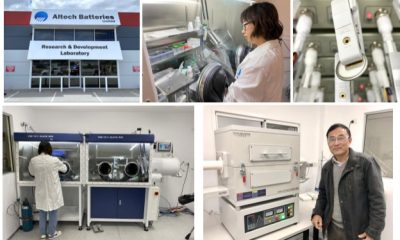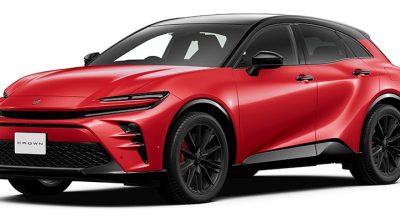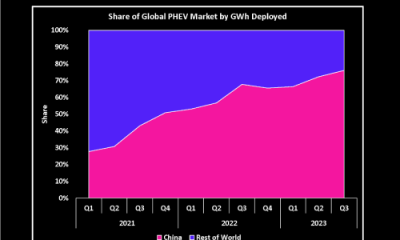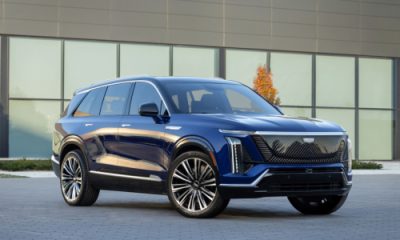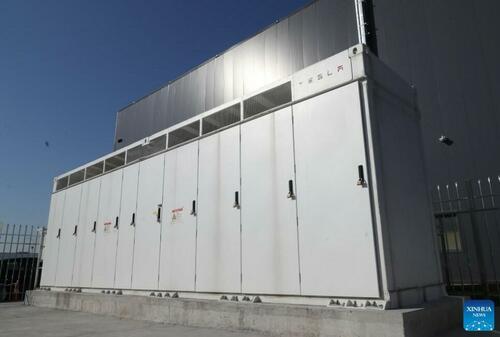Energy & Critical Metals
CMU/Yale Study – BEVS Could be Majority of Cars and SUVs by 2030 Given Technology Trends
A study by a team from Carnegie Mellon University and Yale Universitysuggests that BEVs could constitute the majority or near-majority of cars and SUVs…

A study by a team from Carnegie Mellon University and Yale Universitysuggests that BEVs could constitute the majority or near-majority of cars and SUVs by 2030, given widespread BEV availability and technology trends. Their open-access paper is published in Proceedings of the National Academy of Sciences (PNAS).
A suggestive market-wide simulation extrapolation indicates that if every gasoline vehicle had a BEV option in 2030, the majority of new car and near-majority of new sport-utility vehicle choice shares could be electric in that year due to projected technology improvements alone.
—Forsythe et al.
Hypothetical market-wide simulation for model year 2020 and 2030 where all internal combustion engine and hybrid engine vehicle models have a battery electric vehicle option associated with them. Forsythe et al.
To understand mainstream consumer demand for future EVs, the team of researchers conducted consumer experiments eight years apart to determine what has driven the growth of the EV market and what it would take to increase future adoption.
They found that consumers’ preferences for vehicle attributes such as longer range and cheaper operation haven’t changed much, but that consumers are more willing to adopt EVs as technology improves. With expected range increases and price decreases, the team predicted that demand for electric cars and SUVs could be comparable to gasoline cars and SUVs by 2030.
The team includes Jeremy Michalek, a professor of mechanical engineering and engineering and public policy; Kate Whitefoot, an associate professor mechanical engineering and engineering and public policy; their Ph.D. student Connor Forsythe, and Ken Gillingham, an economics professor at Yale.
Technology has progressed rapidly in the field of EVs. In the past decade, average EV efficiency has increased by 15%, while average range has increased by about 200%. The availability of EV models on the market has improved significantly, and the price-premium has dropped over time. Amidst these trends, states such as California have adopted policies limiting the sale of new gasoline-only vehicles, and manufacturers such as General Motors have called for stronger policies promoting new EV sales.
With these factors in mind, the team first conducted a survey of more than 1,500 prospective vehicle buyers to determine what factors influence their purchasing decisions. They then compared these results to those of a similar consumer survey conducted from 2012-2013. This helped them track changes in the market over time and allowed them to project how demand will grow through 2030.
They found no statistically significant changes in consumer preferences for electric vehicles and electric vehicle attributes over this time, but estimated that the same consumer preferences would produce higher EV adoption as EVs catch up to gasoline vehicles on key attributes such as range and price.
They estimated that if technology trends continue as expected and if EVs become as ubiquitous as gasoline vehicles by 2030, car and SUV buyers will become near indifferent between the two, on average.
Resources
-
Connor R. Forsythe, Kenneth T. Gillingham, Jeremy J. Michalek, and Kate S. Whitefoot (2023) “Technology advancement is driving electric vehicle adoption” PNAS doi: 10.1073/pnas.2219396120

Uranium Exploration Company Announces Additional Staking in the Athabasca Basin
Source: Streetwise Reports 12/22/2023
Skyharbour Resources Ltd. announced an update from its Canada-based Falcon Project along with additional…
Tesla Launches New Mega Factory Project In Shanghai, Designed To Manufacture 10,000 Megapacks Per Year
Tesla Launches New Mega Factory Project In Shanghai, Designed To Manufacture 10,000 Megapacks Per Year
Tesla has launched a new mega factory…
Giving thanks and taking stock after “a remarkable year”
An end-of-year thank you to our readers, industry colleagues and advertisers before Electric Autonomy breaks from publishing until Jan. 2
The post Giving…


